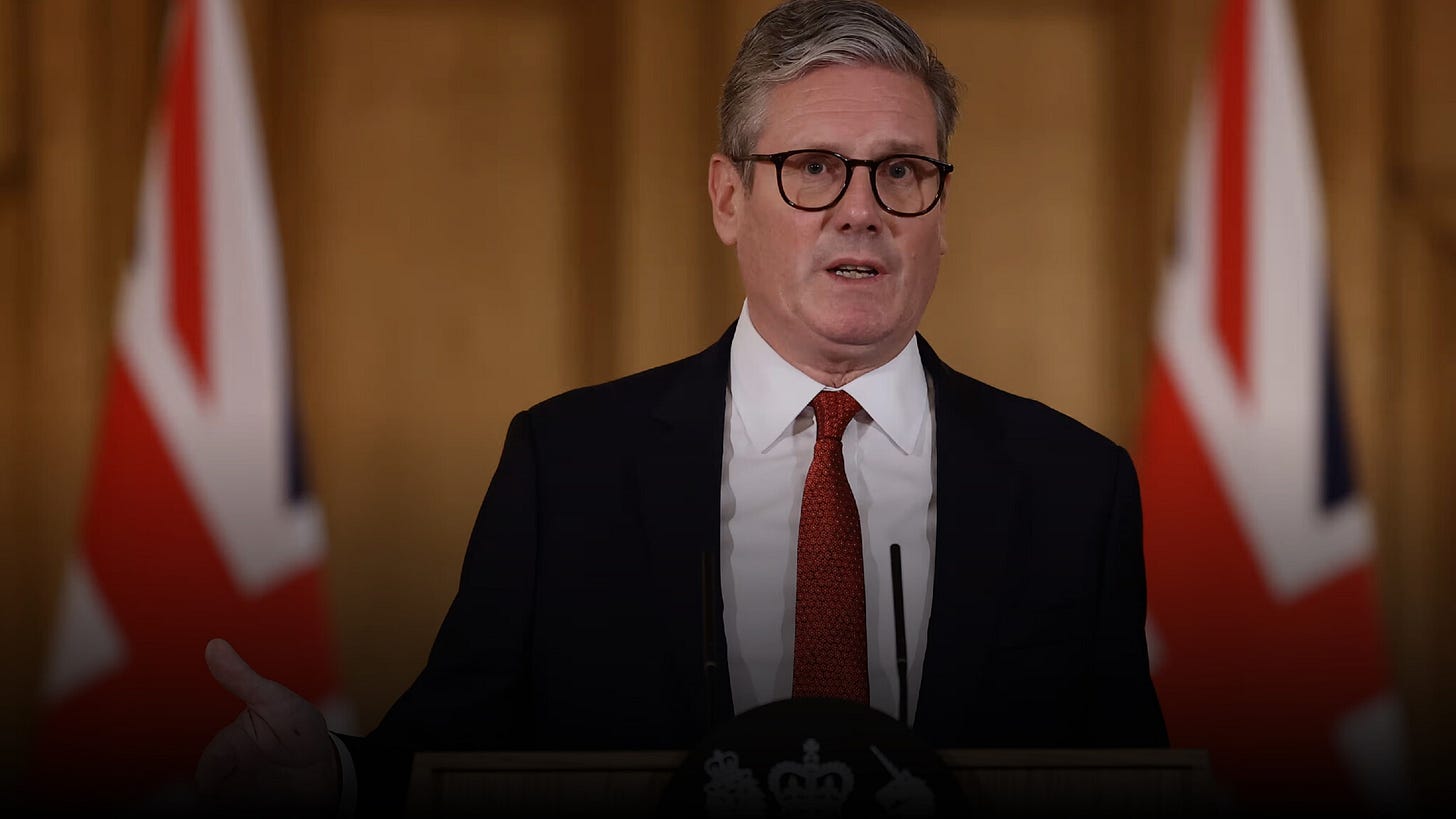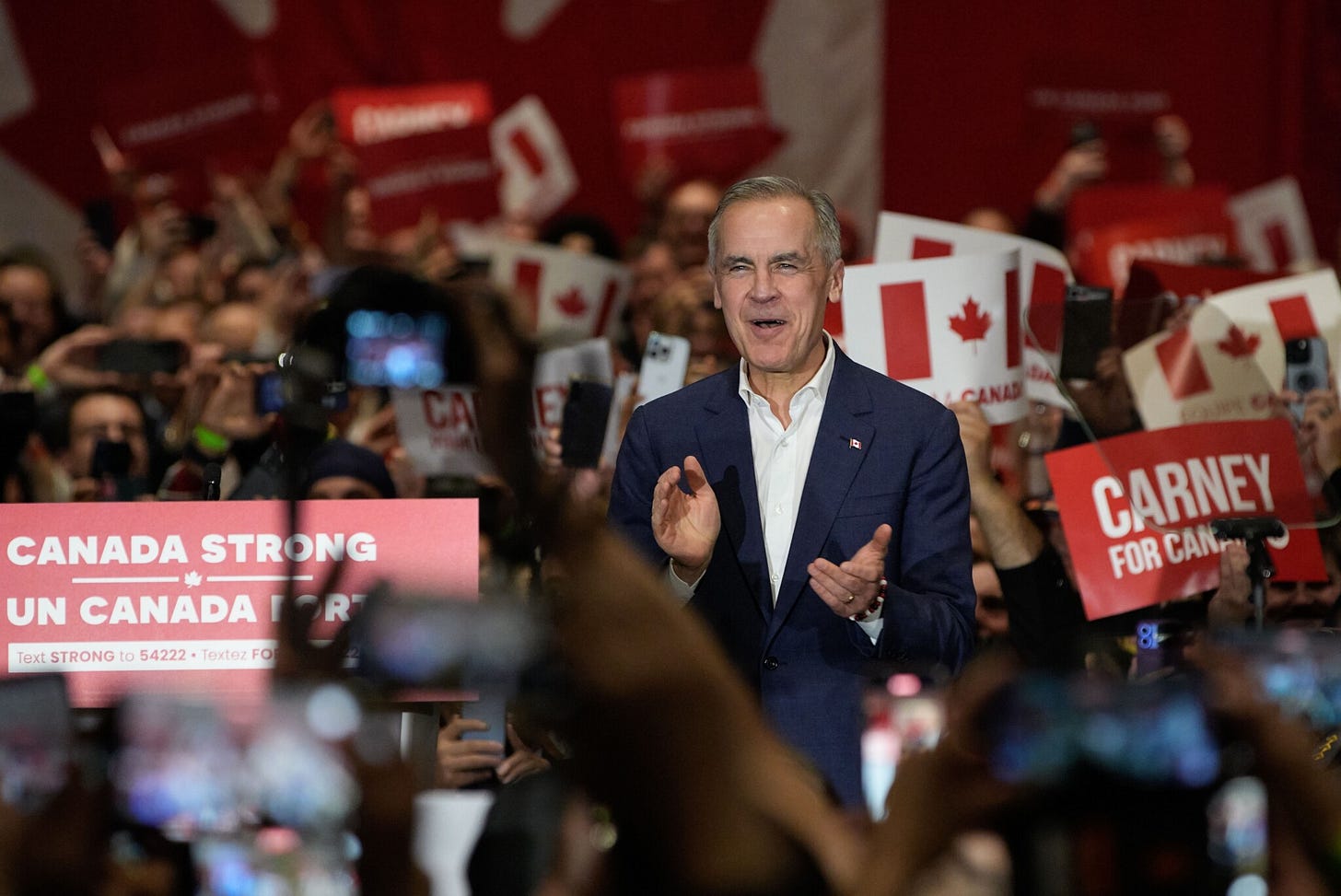Britain’s Managerial State: How Foreign Elites Are Shaping British Policy
Why the British government is shielding its dealings with Bill Gates, Larry Fink, and Mark Carney
This article was first published on Ayaan’s new platform, Courage.Media.
“We live in a managerial revolution.” James Burnham wrote in The Managerial Revolution (1941) that the traditional capitalist ruling class would eventually be replaced, not by workers, as Karl Marx suggested, but by a new elite made up of managers, technocrats, and bureaucrats. These “managers” – those who control the apparatus of institutions, corporations, and governments – would become the new ruling class, exercising power not through ownership but through access, administration, and knowledge.
Fast forward to today, and Burnham’s theory arguably plays out in the seamless interplay between high finance, international philanthropy, and government. Figures such as Carney, Fink, and Gates are not elected officials, yet they have access to, and influence over, core government decision-making in Britain – particularly the economy, central infrastructure, and Net Zero.
Many observed that Bill Gates’ meeting with Keir Starmer on agriculture aligned neatly with his role as the U.S.’s largest private farmland owner
On 21st November 2024, I submitted a Freedom of Information request regarding the details of the meeting between Keir Starmer and Bill Gates during his October 2024 visit, specifically concerning agriculture and farming. Many on social media, rightly, pointed fingers at Gates — not only because he is the largest private farmland owner in the U.S., but because his visit coincided with the UK budget announcement and a sudden crackdown on farmers and the agricultural sector.
It is crucial to address and clarify any potential links without descending into speculation, something that many of us in the alternative media space are occasionally guilty. Given Gates’ history of governmental influence, especially his obscure interest in public health and vaccine initiatives for cattle in Scotland, not to mention his extravagant pursuits in geoengineering and stratospheric aerosol injection, it raises legitimate questions about external influence on public policy. Disclosing this information would help maintain trust in the policymaking process.
Keir Starmer promised at the start of his tenure that his would be “the most transparent government in recent history”, a claim so absurd it was dismissed almost as soon as it was made. Despite record-low trust in governmental bodies, it remains a matter of clear public interest.
After his election win in July last year, Keir Starmer promised the public that he would deliver “the most transparent government in recent history” – a claim so absurd it was dismissed almost instantly
I challenged the use of Section 35 of the FOI Act, which “sets out four exemptions designed to protect good government and provide a safe space for policy making”, and contested the application of Section 43 (the commercial interests exemption), arguing that releasing the information would not harm commercial interests, but rather foster a more informed public debate.
A month later, on 20th December 2024, the Cabinet Office extended the response deadline, citing Section 35 of the FOI Act triggering a public interest test to determine whether releasing the information was appropriate. Most fascinating was their inadvertent admittance that releasing the meeting’s contents (whether a memo or otherwise) could “affect the public policy-making process”. Why is the government delaying transparency, claiming it could impact policy-making, over what they call a “state visit”? This reflects Burnham’s observation of the managerial revolution.
Ben Leo of GB News, a good friend, was one of the very few who covered the story and how a foreign billionaire may be shaping British policymaking. After three months of waiting, I finally received a response from the Cabinet Office — about not only the Gates meeting but also one with Larry Fink of BlackRock.
In my information request, I asked for information on public infrastructure projects, investment details, and any formal documentation outlining a partnership between BlackRock and the UK government. The Cabinet Office confirmed that such meetings occurred including one directly with Larry Fink, but refused to release any meaningful details, citing exemptions for “policy formulation” and “commercial interests”. This reply wasn’t just a bureaucratic delay. It’s the practical manifestation of, as Burnham described, real power shifting from democratic institutions to a transnational managerial elite.
BlackRock is not just an investment firm. It is the most powerful asset manager on earth, with more than ten-trillion dollars under management. It has outpaced its closest competitors not only in assets but in access to governments, central banks, regulators, and global policy platforms. It doesn’t need elections or public mandates. It thrives on quiet collaboration with political actors whose jobs are supposedly to serve the public.
In Burnham’s terms, BlackRock is the embodiment of the “managerial class” — those who don’t own the means of production in the traditional sense, but who control the mechanisms of power through financial systems, data, and governance. When a government withholds information about its dealings with such entities under the pretext of “commercial sensitivity”, it reinforces the idea that we no longer live in a democracy, but under technocratic managerialism where public consent is neither sought nor required. The refusal to disclose is revealing. It shows that policy decisions affecting national infrastructure may be shaped by private actors with no public accountability, and that those decisions are protected from scrutiny by the very systems meant to oversee them.
The Cabinet Office initially claimed that “no records exist” of Gates’ October 2024 meeting with government officials, a truly baffling turn. If no records exist, why were they concerned about releasing them? Later, they admitted the first response was incorrect, then argued that releasing the correct information would “harm government decision-making” and “negatively impact businesses engaging with government”.
Regarding Larry Fink, the Cabinet Office confirmed the Prime Minister met with him on 21st November 2024, but again refused to disclose details, citing policy formulation and commercial interest exemptions. If there’s nothing to hide, why not even release a summary? I’ve now submitted an internal review, though the Cabinet Office refuses to commit to a timeline for responding.
This pattern of stonewalling isn’t limited to Gates or BlackRock. I also submitted an information request about a private meeting between Keir Starmer and Mark Carney — former Governor of the Bank of England, now Prime Minister of Canada. The Cabinet Office acknowledged the meeting and said it held information but again refused disclosure, this time citing Section 27 (International Relations), claiming it could harm diplomatic ties. This, despite the fact that a public summary of the meeting already exists on GOV.UK.
The refusal is telling. Carney is not just a statesman, but a major figure in global finance and a loud advocate of ESG, central bank digital currencies, and Net Zero. His ideological ties to institutions like the World Economic Forum make his role in UK policy circles yet another sign that the managerial elite now operates openly across borders. This, again, is how Burnham described the managerial state — not through votes, but through networks, technocratic consensus, and opaque governance. When information about these meetings is suppressed, we’re not just being denied transparency, we’re being denied the ability to participate in decisions that define our national future.
Carney’s globalist ties show how the managerial elite now steers UK policy across borders and ideologies
What this investigation underscores is a structural reality: when governments routinely shield high-level meetings from scrutiny, especially with global corporate and financial elites, it erodes more than just transparency; it erodes legitimacy.
Democracy requires more than just the right to vote. It demands that citizens have access to the information necessary to evaluate the decisions made in their name. If influential actors such as Bill Gates, Larry Fink, or Mark Carney are involved in shaping UK public policy as the responses from the governmental departments through these requests suggests — especially in areas as critical as agriculture, infrastructure, energy, and finance – then the public has a right to know. This isn’t simply about ideological opposition to these figures, nor about whether their intentions are good or bad. It’s about the process. If a government refuses to share the nature of these discussions or the agreements that may emerge from them, then what separates a democracy from a technocracy?
The increasing prevalence of corporate-government fusion demands a new level of civic vigilance. These actors are not accountable to voters, they do not stand for office, and yet they often hold more sway over public outcomes than elected MPs or ministers. The power lies not in Parliament, but in the boardroom, not in manifestos, but in memoranda. It is not enough to claim that commercial sensitivity or international relations justify secrecy. When major public policies are shaped in private, with citizens kept at arm’s length, the result is political alienation.
The managerial class that Burnham warned of is no longer a theory. It is the reality in which we are now living. This entire investigation has been almost entirely predictable, and yet still eye-opening. It confirms both the government’s lack of transparency and the accelerating shift toward technocracy. A foreign billionaire with no democratic mandate, backed by enormous private wealth, can now exert influence over domestic UK policy. What used to be dismissed as conspiracy theory is increasingly vindicated. Control and policy are now made without the public’s consent, and often, without their knowledge.







TRANS- Parent eh ? I grew Up in the Royal Brittania Empire God Save the King ! George V1..!
Long Live the King ! Sadly he did not and I HAVE HAD TO WAIT 70 Years to see the baby (Grandson Chales) take his place..
BUT for 50 years 1952-2002 ( death of Queen Mother nad Princess margaret) my eyes were opened to the beauty and wonder of the singing and celebration of HER MAJESTY Elizabeth Regina 11 " Spirit of Beth Elijah" The GLORY daughter of Elijah (Elizabeth mother of John Baptiste) shall come to us all before the Lord of ALL NATIONS PEOPLES Tribes/ States/ Cities and Islands shall appear on "SOCIAL Media Glory" .. with a million followers on ..you name it